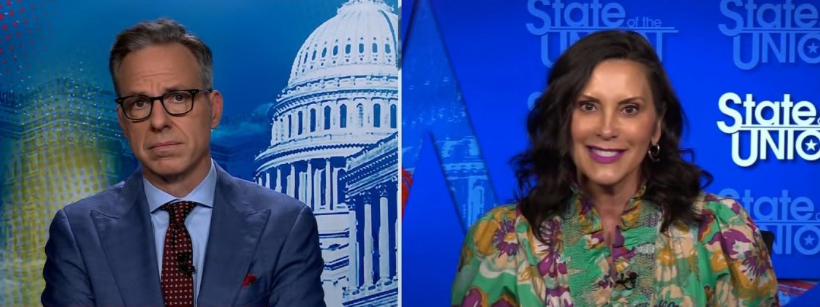Michigan Governor Gretchen Whitmer found herself in a tight spot during a recent interview on CNN’s State of the Union. Host Jake Tapper pressed her on a particularly heated controversy involving her Attorney General, Dana Nessel, and Rep. Rashida Tlaib’s inflammatory comments surrounding the prosecution of anti-Semitic protesters at the University of Michigan. The exchange offered Whitmer a clear chance to back up her attorney general, but she stopped short, choosing instead to avoid taking a firm stance.
Here's the backstory: Attorney General Nessel charged 11 individuals who had participated in far-left protests with crimes that included attempted ethnic intimidation and obstruction of a police officer. These protesters allegedly targeted the Jewish community during the ongoing Israel-Palestine conflict. Nessel’s decision to prosecute was seen by many as a move to uphold law and order, regardless of political sensitivities.
However, this wasn’t how Rep. Tlaib saw it. Instead, she accused Nessel of being biased due to her Jewish heritage. Tlaib claimed that Nessel’s actions were influenced by her religion, suggesting that the attorney general had a vested interest in favoring Israel over Palestine. “It seems that the attorney general decided, if the issue was Palestine, she was going to treat it differently,” Tlaib stated, going as far as to imply that Nessel’s decision-making was compromised by her Jewish identity.
TAPPER: Rabid antisemite @RashidaTlaib called charges against pro-Hamas rioters "shameful" & accused Michigan AG @dananessel of bias. What say you?
KAMALA CO-CHAIR @gretchenwhitmer: There are very fine people on both sides. pic.twitter.com/j43nCwLOdL
— Trump War Room (@TrumpWarRoom) September 22, 2024
Nessel didn’t hold back in her response, calling out Tlaib for weaponizing her faith in such a way. “Rashida Tlaib should not use my religion to imply I cannot perform my job fairly as attorney general. It’s antisemitic and wrong,” Nessel declared, firmly standing her ground against the accusations.
But when Whitmer was given the opportunity to defend Nessel, she opted for neutrality. In her first response to Tapper, Whitmer emphasized the need to protect and respect both the Jewish and Palestinian communities, a statement that left many scratching their heads. This wasn’t a question about community relations, it was about whether or not she would stand up against a clearly anti-Semitic attack on her attorney general.
Tapper didn’t let the issue drop. He asked again, stressing how serious Tlaib’s accusation was and offering Whitmer another opportunity to show support for Nessel. But Whitmer didn’t budge, repeating her earlier stance. “Like I said, Jake, I’m not going to get in the middle of this argument that they’re having,” she responded.
For many, this kind of political evasion doesn’t cut it. The governor’s refusal to explicitly back her attorney general amid accusations of anti-Semitism raises questions. Is Whitmer wary of alienating a prominent progressive like Tlaib, or is she simply trying to avoid inflaming an already tense situation? Whatever the case, her reluctance to take sides on such a crucial issue could come back to haunt her.
This incident highlights the delicate balance that Democratic politicians often have to strike. With tensions in the Israel-Palestine debate running high, Whitmer may have been looking to avoid further escalation. But in her attempt to remain neutral, she missed an opportunity to take a strong stand against anti-Semitism—something that many voters would expect in such a moment.

